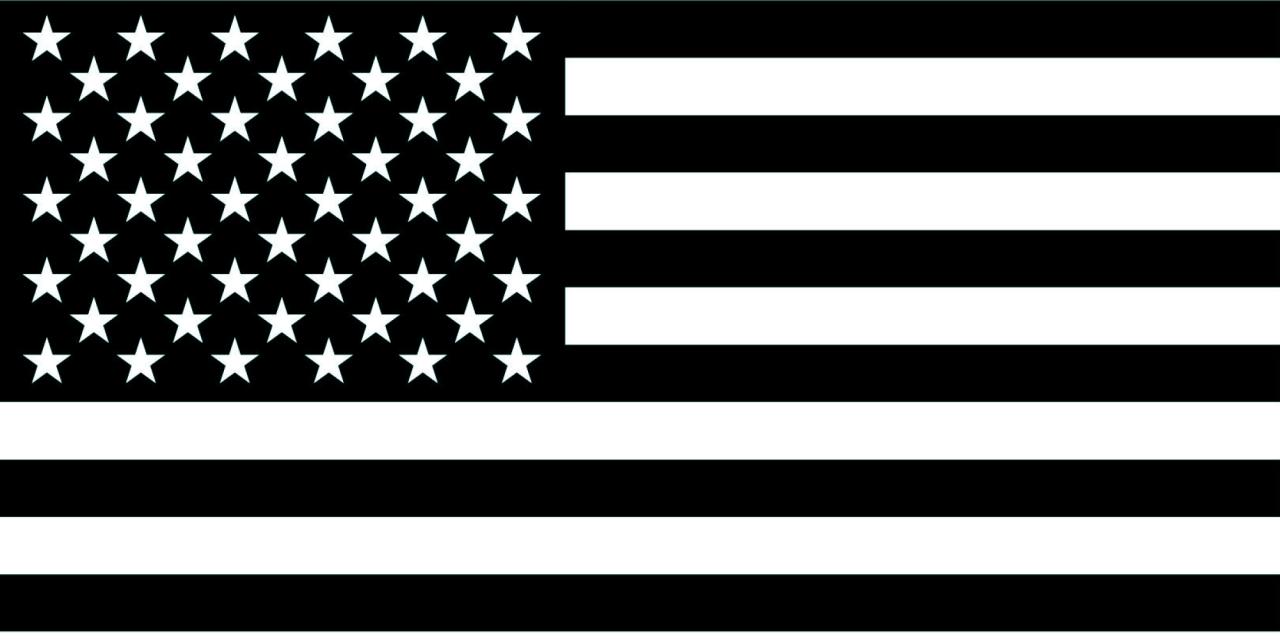The Black American Flag: A Symbol of Protest, Resistance, and Resilience
Amidst the vibrant tapestry of American flags that flutter in the breeze, there exists a lesser-known yet profoundly meaningful variation: the black American flag. This monochromatic banner, devoid of the traditional red, white, and blue, has become a potent symbol of protest, resistance, and the enduring resilience of African Americans in the face of adversity.
Origins and History
The black American flag emerged as a political statement during the tumultuous civil rights era of the 1960s. It first gained prominence as a symbol of racial pride and unity among members of the Black Panther Party, a revolutionary organization that fought against police brutality, systemic racism, and economic inequality.
The flag’s simplicity and starkness were deliberately chosen to convey a message of mourning, oppression, and defiance. The black color represented the pain and suffering experienced by African Americans throughout history, while the absence of the stars and stripes symbolized their exclusion from the American dream of freedom and equality.
Symbolism and Meaning
The black American flag carries a multitude of meanings and interpretations, each reflecting the diverse experiences and perspectives of African Americans. For some, it is a symbol of:
- Mourning and remembrance: The black color evokes the deep sorrow and loss endured by African Americans due to slavery, racial violence, and systemic oppression.
- Protest and resistance: The flag serves as a visible expression of defiance against racism, inequality, and the ongoing struggle for justice.
- Black pride and unity: It represents the resilience, strength, and sense of community among African Americans in overcoming adversity.
- Challenge to the status quo: The absence of the stars and stripes challenges the traditional narrative of American exceptionalism and exposes the hypocrisy of a nation founded on ideals of equality while perpetuating racial inequality.
Controversies and Misinterpretations
Despite its powerful symbolism, the black American flag has often been met with controversy. Some have condemned it as unpatriotic or disrespectful, while others have accused it of promoting separatism or anti-white sentiment.
It is crucial to emphasize that the black American flag is not intended as an alternative to the traditional American flag. Rather, it is a complementary symbol that highlights the historical and ongoing struggles faced by African Americans and demands recognition of their full humanity and rights as citizens.
Contemporary Usage and Impact
The black American flag has gained increasing visibility in recent years, particularly during protests against police brutality and racial injustice. It has become a symbol of solidarity and resistance for African Americans and their allies, both within the United States and around the world.
The flag’s presence in public spaces and on social media has sparked important conversations about racial inequality, historical injustices, and the need for systemic change. It has also served as a catalyst for artistic expression and cultural activism, inspiring countless works of art, music, and literature.
FAQs
Q1: Is the black American flag an official flag?
A1: No, the black American flag is not recognized as an official flag by the American government. It remains an unofficial symbol used to express political views and raise awareness about racial injustice.
Q2: What does the absence of the stars and stripes symbolize?
A2: The lack of stars and stripes represents the exclusion of African Americans from the American dream and the hypocrisy of a nation that proclaims equality while perpetuating racial inequality.
Q3: Is it disrespectful to fly the black American flag?
A3: Whether or not flying the black American flag is considered disrespectful is a matter of personal interpretation. However, it is essential to understand the historical and cultural significance of the flag and to approach it with respect and sensitivity.
Q4: How is the black American flag interpreted by non-African Americans?
A4: The black American flag can evoke various reactions among non-African Americans, ranging from empathy and support to misunderstanding or even hostility. It is important to engage in respectful dialogue and education to foster a deeper understanding of its symbolism and purpose.
References:
- "The Black Flag: Symbol of Resistance and Mourning" by Khalil Gibran Muhammad, The New York Times (2015)
- "The Black Power Flag: A Symbol of Black Pride and Resistance" by the African American Registry (2018)
- "The Black American Flag: Pros and Cons" by Rashida Tlaib, Congresswoman (2021)
